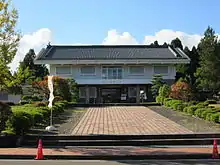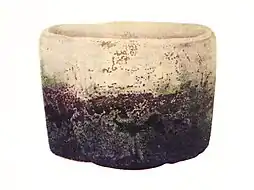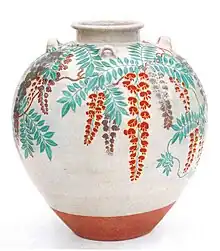_LACMA_M.2008.264.5.jpg.webp)
Echizen ware sake bottle (tokkuri), Momoyama period, late 16th century
_with_Wave_Pattern_MET_2015_300_265_Burke_website.jpg.webp)
Echizen ware widemouthed oil jar (kame) with wave pattern, stoneware with natural ash glaze, Edo period, 18th century

Echizen Pottery Village, Fukui Pottery Museum
Echizen ware (越前焼, Echizen-yaki) is a type of Japanese pottery traditionally produced in Echizen, Odacho and Miyazaki Fukui Prefecture.[1][2]
It is considered one of the Six Ancient Kilns of Japan.[3][4][5]
The Echizen Pottery Village showcases a wide variety of this pottery style.[6][7]
References
- ↑ 山口百々男 (20 March 2014). 和英:日本の文化・観光・歴史辞典【改訂版】. 三修社. pp. 50–. ISBN 978-4-384-05183-4.
【越前焼き】 Echizen ceramic ware (produced in present-day Fukui Prefecture)
- ↑ William E. Deal (2005). Handbook to Life in Medieval and Early Modern Japan. Oxford University Press. pp. 299–. ISBN 978-0-19-533126-4.
Echizen Ware Echizen-yaki. Located near the city of Kanazawa on the west coast of central Honshu. One of the so-called Six Ancient Kilns.
- ↑ Amassing Economies: The Medieval Origins of Early Modern Japan, 1450--1700. 2008. pp. 67–. ISBN 978-0-549-85115-8.
The major styles represented by the Six Old Kilns sort themselves into three major regional distribution patterns (Figure 2.1). Suzu and Echizen pottery, the ceramics from the Shinori hoard, indicate a sphere of interaction that stretched from ...
- ↑ Patricia Salmon (1975). A guide to Japanese antiques. Van Nostrand Reinhold Co. pp. 110–. ISBN 978-0-442-25091-1.
SIX ANCIENT KILNS POTTERY— BIZEN, TAMBA, SETO, SHIGARAKI, ECHIZEN, TOKONAME Pottery making began in Japan in the Neolithic period, called Jomon. The earliest forms were pots with pointed or rounded bottoms used for ...
- ↑ Bill Geisinger (May 2010). Potters of Japan: Another Look at the Timeless Art of Nine Families. Bill Geisinger. pp. 2–. ISBN 978-0-9754351-3-7.
... expanding the traditions of the original six old kilns (rokkouyo). The idea of six old kilns is representative but not all-inclusive. Pottery styles come from Bizen, Shigaraki, Seto, Echizen, Tamba, Tokoname, Karatsu, Hagi, Iga, Mino, and more.
- ↑ The Traditional Crafts of Japan: Ceramics. Diamond, Incorporated. 1992. pp. 147–.
Potters who lack experience in this method are likely to come down with a good case of vertigo when practicing it for the first ... Influenced by the nationwide pottery boom, an Echizen Pottery Village was built in Miyazaki village around 1970.
- ↑ Arts. Vol. 18–19. Minneapolis Society of Fine Arts. 1995. pp. 13–.
Undoubtedly inspired by this revival, the Fukui prefectural government and the town of Miyazaki voted in 1970 to subsidize the creation of the Echizen Pottery Village, where struggling potters were encouraged to establish their homes and ...
External links
![]() Media related to Echizen ware at Wikimedia Commons
Media related to Echizen ware at Wikimedia Commons
- Echizen - One of Japan's Six Old Kilns
- Echizen Pottery Village
- Echizen Ware: Characteristics
- Echizenyaki (in Japanese)
This article is issued from Wikipedia. The text is licensed under Creative Commons - Attribution - Sharealike. Additional terms may apply for the media files.

